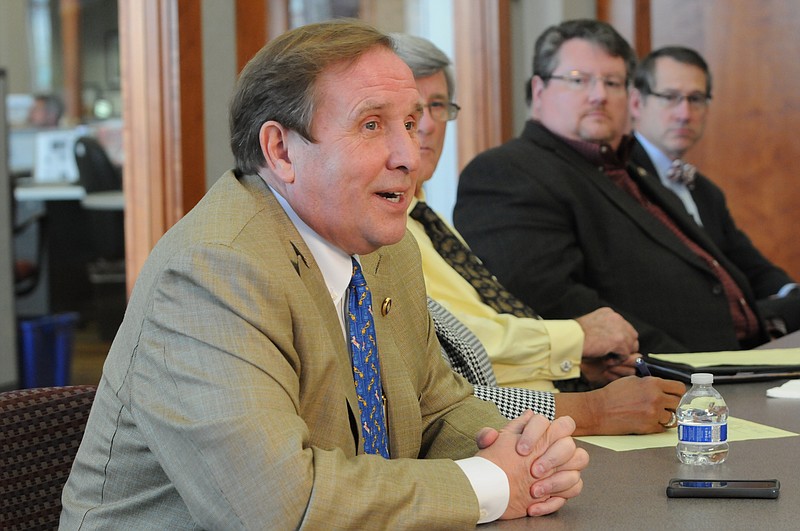NASHVILLE - State Rep. Mike Carter, R-Ooltewah, hopes to ride this week through a key House panel on a retooled version of his controversial bill restricting city and county use of state highway fund gas taxes for pedestrian, bicycle and other facilities.
Carter believes he now has majority support among House Finance Subcommittee members on the bill after it was substantially rewritten last week by two amendments. It also no longer has opposition from state transportation officials.
"I was not good when we started with the language," Carter said of the legislation, sponsored by Sen. Todd Gardenhire, R-Chattanooga, in the upper chamber.
But Matt Farr, executive director of the advocacy group Bike Walk Tennessee, says Carter's alterations haven't changed the organization's opposition to the measure.
Among problems, Farr said, the bill still bars state and local governments from using fuel taxes to fund bicycle lanes or shared lanes on roads with posted speeds over 35 mph.
"Those roads are the places where we want bicycle facilities, because faster cars mean more injuries and higher fatality rates," Farr said. "It doesn't make sense to prohibit them on higher-speed roads."
Roads and highways with speeds of 35 mph or below must have an engineering study, which Farr and other opponents say is costly and problematic.
The bill is up for further discussion and an expected vote on Wednesday in the House subcommittee.
Last week, subcommittee members approved amendments that rewrote portions of the bill which, as originally introduced, barred use of state fuel taxes, as well as those shared with local governments, for bike paths, bike lanes, sidewalks, walking trails, greenways and more.
That had bicyclists popping wheelies and drew a negative recommendation from Senate Finance Committee members.
Carter and Gardenhire say they introduced the bill in light of Gov. Bill Haslam's plans to press lawmakers to approve gas tax increases for state transportation needs, an effort later postponed until 2017.
The lawmakers say it was intended to assure voters the state was doing everything it could to spend money on roads, highways and bridges.
Haslam says Tennessee has a $6.1 billion backlog of transportation projects, including roads, highways, bridges and other items.
Carter said the bill doesn't prevent local governments from spending non-gas tax revenue on bike lanes, paths and other items.
As now amended, the bill prohibits gas tax revenue distributed to the state highway fund as well as to cities and counties from being used to construct, improve or maintain pedestrian and bicycle paths, parks, greenways and similar facilities open to public use for non-vehicular travel.
The money ban also applies to public roads with posted speed limits greater than 35 miles per hour.
But the prohibition does not apply to the construction, improvement, or maintenance of sidewalks.
For new or reconstructed roads with a proposed posted speed limit of 35 mph or less, the amended bill also bars gas tax revenues being used for the construction of a new dedicated bicycle lane. But it allows what Carter considers a major exception. The money can be used if the work is part of a larger highway improvement project and the bicycle lane serves a transportation purpose supported by an engineering analysis.
The amended bill now makes clear the measure won't block the state, a county or a city from receiving or using federal funds for the construction, improvement, maintenance or operation of non-vehicular facilities.
Nor will it bar state and local governments from using gasoline tax revenue to match any federal-aid funding for such facilities.
The bill also doesn't stop state or local governments from using gas tax revenue to maintain existing bicycle lanes or to accommodate bicycles in existing bike lanes or on shoulders or via shared lanes.
Other provisions say the bill also allows the Tennessee Department of Environment and Conservation to use grants from the Department of Transportation or federal programs for recreational trails in state parks.
It also would not affect the Tennessee Wildlife Resources Agency from using gas tax funds distributed to the agency to carry out provisions under the Tennessee Boating Safety Act of 1965.
Contact Andy Sher at asher@timesfreepress.com, 615-255-0550 or follow via twitter at AndySher1.
